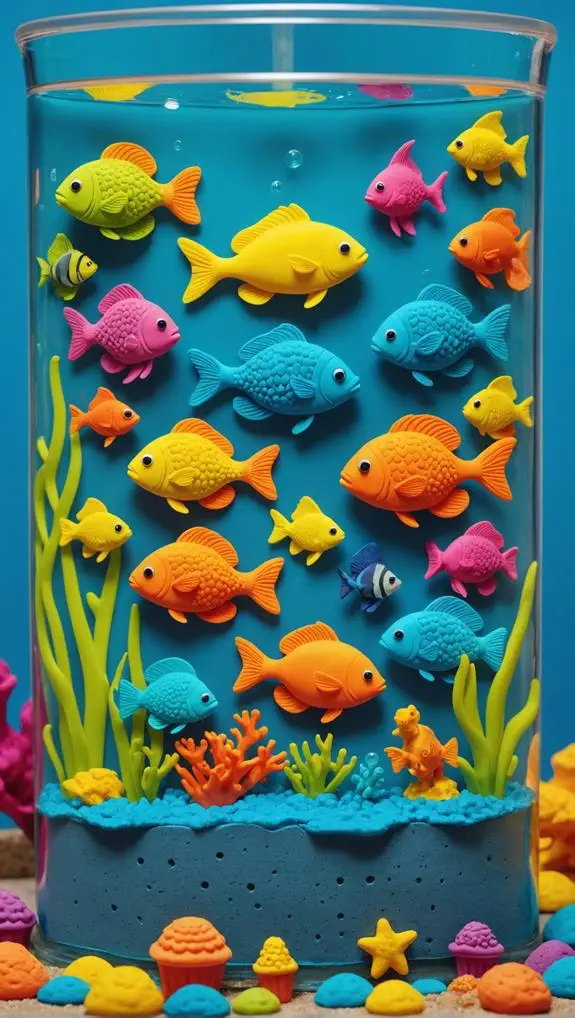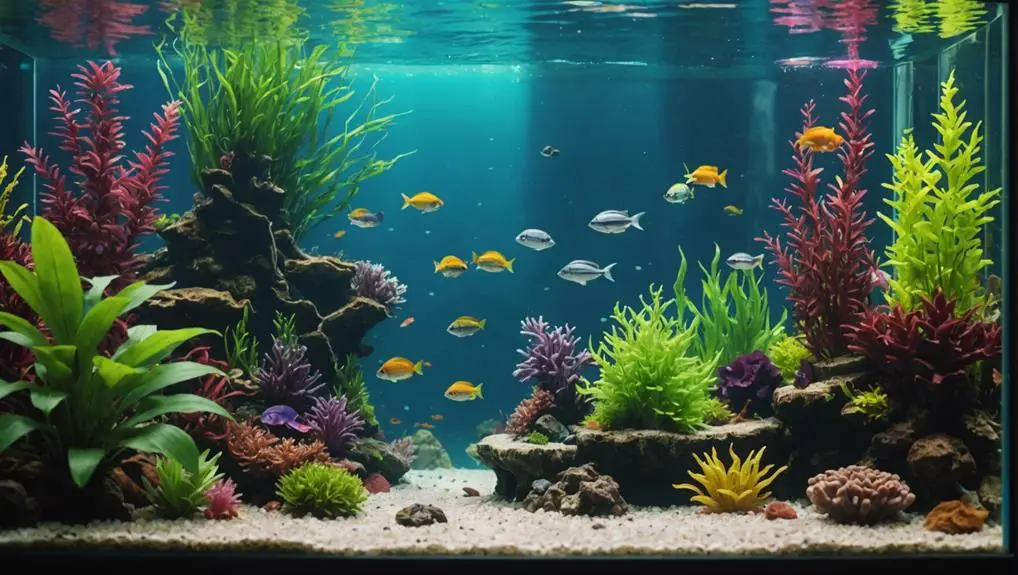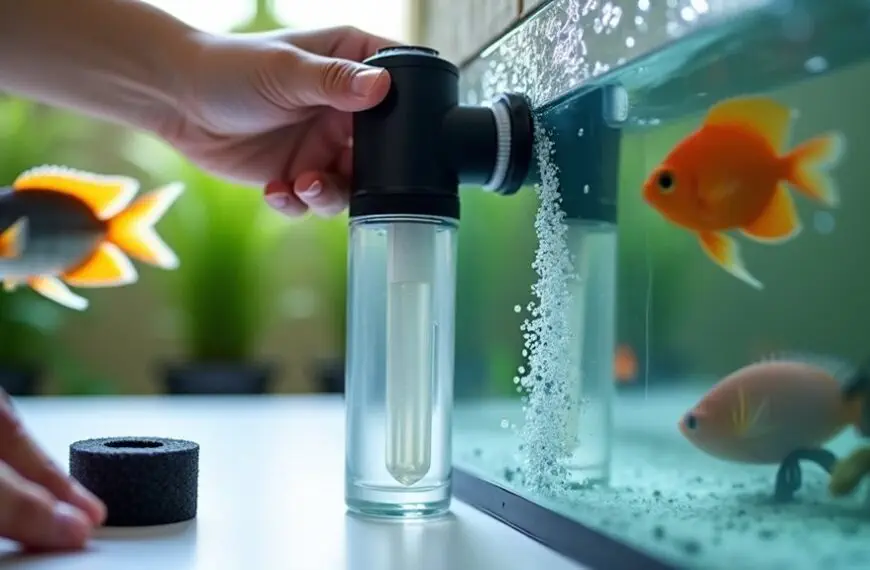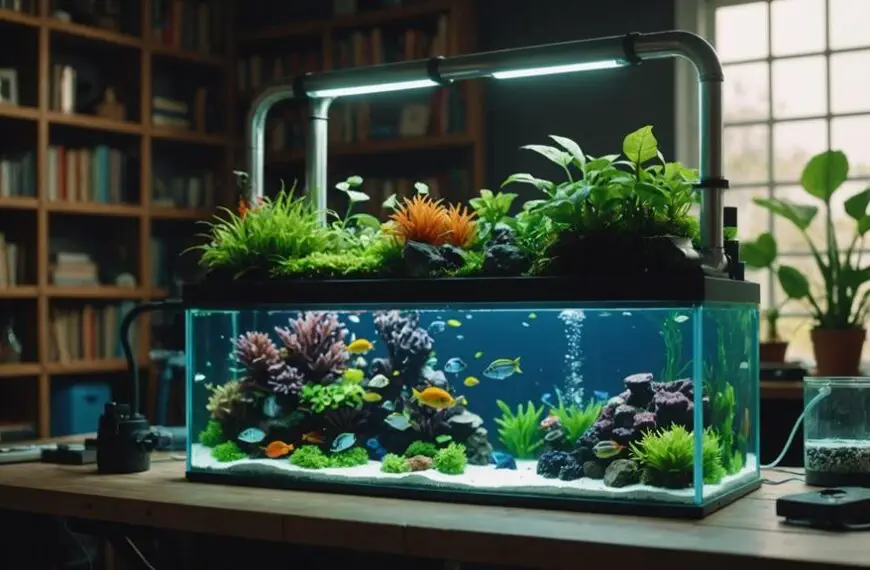Mechanical filtration in fish tanks is like a superhero for your underwater world! It helps keep your tank clean by trapping debris, fish waste, and leftover food, making the water clearer and healthier for your fishy friends. You've got several filter media options, like pads, socks, or rollers, each tailored to different tank sizes. But don't forget, regular maintenance is key! By changing your filter pads weekly and cleaning the others, you prevent toxic buildups and promote beneficial bacteria growth. A clean tank not only looks great but keeps your aquatic pals thriving, too! Stick around, and you'll discover even more tips!
Contents
- 1 Understanding Mechanical Filtration
- 2 Importance of Mechanical Filtration
- 3 Types of Mechanical Filtration Media
- 4 Comparing Mechanical Filter Options
- 5 Maintenance of Mechanical Filtration
- 6 Mechanical vs. Biological Filtration
- 7 Impact on Water Quality
- 8 Selecting the Right Filter Media
- 9 Frequently Asked Questions
- 10 Final Thoughts
Understanding Mechanical Filtration
When it comes to maintaining a healthy fish tank, understanding mechanical filtration is essential. Think of it as the first line of defense for your aquatic buddies. Mechanical filtration removes suspended particles, like fish waste and uneaten food, helping keep your water clear and fresh.
That's where filter pads, socks, and rollers come into play. Each type caters to different tank sizes and needs, so you can pick one that fits your setup perfectly! Regular water changes are also crucial, as they help improve water quality by reducing ammonia and nitrites, ensuring a clean environment for your fish promotes fish health.
Regular maintenance is key. You wouldn't want to wait until your filter pads are practically clogged to change them, right? Weekly replacements help ensure your filtration systems work effectively, preventing toxic buildups that can harm your fish.
Plus, by capturing solids early, you're allowing beneficial bacteria to grow in the biological filtration stage, which is a win-win for water quality.
Importance of Mechanical Filtration
Mechanical filtration is super important for your fish tank, and here's why. It keeps the water clear by capturing all that pesky fish waste and leftover food, making sure your aquatic friends live in a clean environment.
By efficiently removing debris and preventing cloudiness, mechanical filtration also supports the overall water quality management of your aquarium.
Plus, it helps prevent toxic buildups, so you can spend more time enjoying your tank instead of worrying about what's lurking in the water!
Enhances Water Clarity
In aquariums, having crystal-clear water is essential for both the health of your fish and the overall aesthetic of your setup. You want your aquatic friends to thrive, and mechanical filtration is a key player in achieving that water clarity. This filtration method works hard to trap and remove suspended particles like uneaten food and fish waste, making your tank look pristine.
Using various types of filter media, such as pads, socks, and rollers, mechanical filtration captures dirt and debris that would otherwise cloud your water. Think of it as a superhero for your aquarium!
But don't forget about regular maintenance. Cleaning and replacing your filter media ensures it operates at its best. No one wants a tank that looks like a science experiment!
Also, consider your tank size when choosing filter media. A filter pad works wonders for smaller tanks, while filter socks are ideal for larger setups.
Prevents Toxic Buildup
The health of your fish tank relies heavily on effective filtration, as it prevents toxic buildups that can threaten aquatic life. Without mechanical filtration, fish waste and uneaten food can decompose, leading to nasty chemicals like ammonia and nitrite. No one wants to be the fish parent who inadvertently throws a toxic party!
By capturing visible debris, mechanical filtration keeps your tank clean and maintains water clarity, which is essential for healthy plants and corals.
Plus, a clean tank means your beneficial bacteria can work their magic, converting harmful ammonia into less toxic nitrates without the competition of organic matter.
Remember, if the particulate matter piles up, you might find yourself facing sudden ammonia spikes, which can stress your fish and increase their risk of disease.
Routine maintenance, like replacing filter pads or cleaning filter socks, is key to preventing toxic buildups and ensuring stable water quality.
Supports Overall Health
Clear water is vital for the overall health of your fish tank, and that's where mechanical filtration shines. It plays a crucial role in maintaining water quality by removing fish waste, uneaten food, and floating debris. If these particles build up, they can create toxic conditions for your aquatic friends. You wouldn't want to swim in a dirty pool, right?
Using filter media like pads and socks helps prevent organic waste from decomposing, which can produce harmful ammonia and nitrite—definitely not something you want in your tank!
Plus, a clean environment supports bio-filtration processes, allowing beneficial bacteria to thrive and manage toxins effectively.
Choosing the right mechanical filtration media depends on your tank size and how often you can maintain it. Regularly replacing these filters—ideally 1-2 times a week—ensures optimal flow rates and keeps your aquatic life happy.
Types of Mechanical Filtration Media

When it comes to keeping your fish tank sparkling clean, choosing the right mechanical filtration media is key.
You've got options like filter pads, which are budget-friendly and easy to replace, or filter socks that let you trap those pesky particles while being reusable—talk about a win-win!
And if you want something low-maintenance, filter rollers might just be your new best friend, rolling away all the gunk while you kick back and enjoy your underwater paradise.
Filter Pads Overview
Versatility is key in choosing mechanical filtration media for your fish tank, and filter pads stand out as an effective option. These handy pads do a fantastic job of capturing suspended particles, enhancing your aquarium's clarity and overall water quality.
Here's what you need to know about filter pads:
- Various Thicknesses: Filter pads come in different thicknesses, making them suitable for tanks ranging from 5 to 55 gallons.
- Material Matters: Most are made from polyester, ensuring durability and efficiency in capturing debris.
- Regular Maintenance: To keep your tank thriving, replace filter pads weekly. This simple task helps prevent ammonia buildup from decomposing waste.
- Finer vs. Coarser: Finer pads trap smaller particles, while coarser ones can be rinsed and reused, saving you money.
With the right filter pads, you're not just maintaining your tank—you're serving your fish a cleaner, healthier environment.
Filter Socks Benefits
Filter socks offer a robust alternative to filter pads, enhancing mechanical filtration in your fish tank.
These handy tools are designed to trap particulate matter like uneaten fish food and organic waste, which helps keep your aquarium water crystal clear. If you've got a tank over 55 gallons, filter socks are perfect for you!
Made from durable materials, they can capture particles down to 100 microns.
This means even the tiniest debris doesn't stand a chance! Plus, they're reusable after cleaning, so you can save a few bucks while serving your aquatic friends.
Just make sure to rinse and dechlorinate them every 1-2 weeks to prevent clogging.
Filter Rollers Features
One of the standout features of filter rollers is their ability to simplify mechanical filtration in your aquarium.
These handy devices are perfect for capturing suspended particulates in your aquarium water, ensuring that your aquatic friends swim in clean surroundings.
Here are a few key benefits:
- Low Maintenance: Filter rollers require less fuss than traditional filters, helping you focus on enjoying your tank instead of endless cleaning.
- Efficient: They effectively trap organic matter, keeping your water clear and your fish happy.
- Easy Replacement: You can quickly rotate or replace the filter media, so you won't have to wrestle with stubborn pads anymore.
- Ideal for Larger Tanks: Perfect for tanks of 75 gallons or more, filter rollers make maintaining water quality a breeze.
Comparing Mechanical Filter Options
When comparing mechanical filter options, you'll find various types suited for different tank sizes and needs.
If you've got a smaller tank, filter pads are a fantastic choice. They're cost-effective for tanks ranging from 5 to 55 gallons and should be replaced weekly for that sparkling water clarity.
Now, if your tank's over 55 gallons, filter socks come into play. These reusable gems can be cleaned multiple times, making them a sustainable option for trapping particulates effectively.
For those with larger tanks over 75 gallons, filter rollers might be your best friend. They use rolled filter pads and require minimal maintenance, ensuring consistent performance with just a few regular replacements.
Maintenance of Mechanical Filtration

Maintaining mechanical filtration is essential for ensuring a healthy aquarium environment. Your fish depend on you to provide clean, clear water, and that starts with proper maintenance of your mechanical filter media.
Implementing a good filtration system is crucial for a thriving aquatic life, as it effectively captures debris and prevents harmful bacteria growth essential filtration systems.
Here are some key steps:
- Replace filter pads weekly: Fresh pads help capture more debris and keep your water crystal clear.
- Clean filter socks 1-2 times a month: Regular cleaning prevents clogging, ensuring efficient water flow.
- Monitor for blockage: Keep an eye on your filter media. If it's clogged with debris, clean or replace it to maintain water quality.
- Document replacement schedules: Jot down when you replace or clean your filter media to avoid lapses that could harm your fish.
Mechanical vs. Biological Filtration
Understanding the distinction between mechanical and biological filtration is crucial for any aquarium owner.
Mechanical filtration is like the vacuum cleaner of your fish tank, scooping up visible particles like fish waste and uneaten food. This process improves water clarity, making your aquarium look sharp and inviting.
On the other hand, biological filtration is where the magic happens. It relies on beneficial nitrifying bacteria to convert harmful ammonia and nitrite into less toxic nitrate, keeping your fish happy and healthy.
While mechanical filtration gives you immediate results, enhancing the aesthetic appeal of your tank, biological filtration offers a long-term solution for waste management.
You'll find that mechanical filters require regular media replacement and maintenance, while biological filters mostly need monitoring for clogging after they're established.
This difference can significantly affect your aquarium's overall organic load. If your mechanical filtration isn't up to snuff, waste can pile up, stressing your nitrifying bacteria and potentially causing toxic spikes.
Impact on Water Quality

Mechanical filtration plays a vital role in maintaining water quality in your aquarium.
It's like the superhero of your tank, swooping in to keep things clean. By removing debris, it helps to prevent the buildup of toxic ammonia and nitrite that can harm your fish.
Here are a few key impacts of mechanical filtration on water quality:
- Traps Debris: It captures fish waste and uneaten food, ensuring crystal-clear water.
- Reduces Organic Matter: By lowering the organic load, it helps keep your tank healthy.
- Supports Biological Filtration: With less organic matter, beneficial bacteria can thrive, effectively managing the nitrogen cycle.
- Maintains Optimal Flow: Regularly replacing filter media keeps water flowing smoothly, avoiding spikes in harmful substances.
Selecting the Right Filter Media
Choosing the right filter media is crucial for keeping your aquarium clean and your fish healthy. When you select filter media for mechanical filtration, think about your tank size and the specific needs of your aquatic friends.
For smaller tanks, filter pads are a cost-effective option, but you'll need to replace them weekly. If you have a larger tank (55 gallons and up), consider filter socks—they're reusable, which saves you some cash and reduces waste!
For those with 75-gallon tanks or more, filter rollers can be a great low-maintenance choice. These rolled filter pads do a fantastic job at removing debris, but don't forget to replace them regularly for peak performance.
Also, keep an eye on the micron rating of your filter media. Finer filters capture smaller particles, while coarser options like sponges can be cleaned multiple times.
Regular maintenance is key, so make a habit of checking and cleaning your pads and socks every week or two. By choosing the right filter media and staying on top of maintenance, you'll keep your aquarium's water clear and your fish thriving.
Happy filtering!
Frequently Asked Questions
What Is the Mechanical Method of Filtration?
The mechanical method of filtration involves using specific filter materials for efficient particulate removal, ensuring water clarity. Proper filter placement and regular maintenance frequency enhance filtration efficiency, benefiting both your aquarium and the aquatic life you cherish.
What Is the Difference Between Mechanical and Biological Filtration?
Picture a dance between water clarity and filtration media. Mechanical efficiency captures particles, while biological filtration transforms toxins. You'll notice filter types differ in maintenance frequency, ensuring your aquatic friends thrive in their crystal-clear world.
What Are the Three Types of Filtration for Fish Tanks?
You've got three main types of filtration for your fish tank: mechanical, biological, and chemical. Consider various filter media options, choose the right filter size, and follow filter maintenance tips for effective filtration system setup.
Do You Need Mechanical Filtration?
Imagine your aquarium thriving with vibrant fish. You need mechanical filtration for debris removal, ensuring water clarity and fish health. Regular filter maintenance boosts filtration systems' efficiency, highlighting its importance and benefits for a flourishing aquatic environment.
Final Thoughts
In a nutshell, mechanical filtration's a must for keeping your fish tank fabulous and fresh. By snatching up debris and dirt, it helps maintain that crystal-clear water your fish adore. Don't forget, choosing the right filter media and staying on top of maintenance will keep your aquatic friends swimming happily. So, dive into the world of filtration, and let your tank sparkle! After all, a clean tank means a cheerful community of fish!












